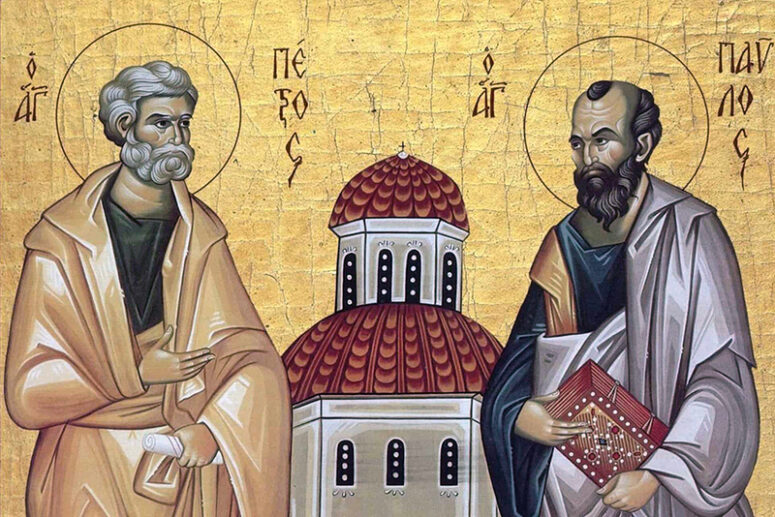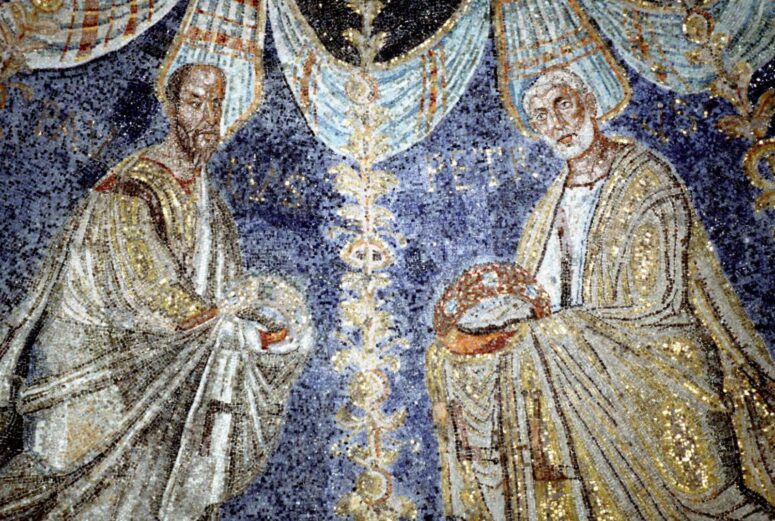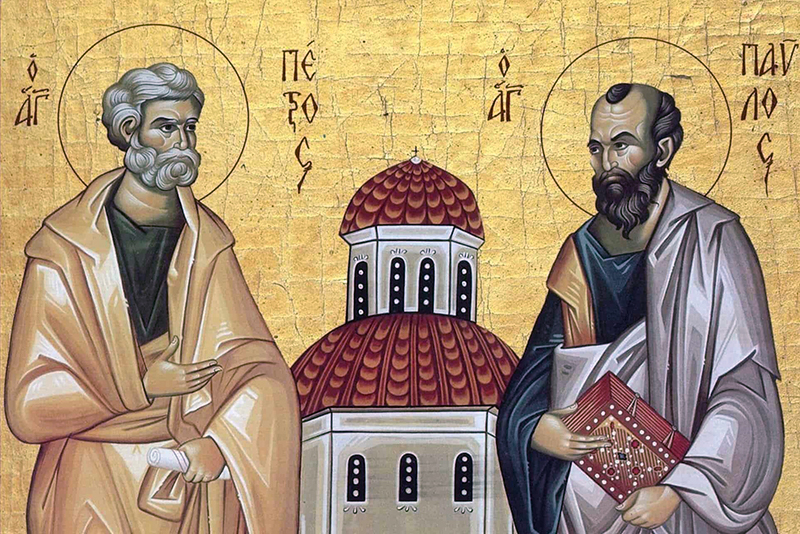
For to me to live is Christ, and to die is gain: these famous words of the Apostle Paul (Phil. 1:21) have long become the standard of the Christian attitude towards death. Peter also has lines similar in meaning: Think it not strange concerning the fiery trial which is to try you, as though some strange thing happened unto you: But rejoice, inasmuch as ye are partakers of Christ’s sufferings (1 Pet. 4: 12-13). Does this mean that the apostles themselves did not consider it necessary to beware of adversity and easily walked towards death? Let’s figure it out.
The apostles were brave people, weren’t they?
Undoubtedly. They became especially courageous after the Lord sent them His gracious gifts on the day of Pentecost to strengthen them in the forthcoming apostolic ministry.
But even before that they were not timid. When Christ invited the disciples to go with Him to Judea, where the Pharisees had long threatened to kill Him, the Apostle Thomas exclaimed: Let us also go, that we may die with him (John 11:16). (“With him” is with the recently deceased Lazarus, whom Christ was just about to “awake”.)
Then, after the Lord resurrected and ascended, the Apostle Peter more than once declared to the faces of the Jewish leaders – the Pharisees and the high priests – We ought to obey God rather than men. (Acts 5:29). And after they beat the apostles, wanting to put an end to their preaching about Jesus, they went home, as the Scripture says, rejoicing that they were counted worthy to suffer shame for his name (Acts 5:41).
Does all this mean that Christ’s disciples did not at all think about their own safety?
No, it doesn’t.
And what made them beware?
The apostles faced a very real threat: the pagan authorities persecuted their community, sought to destroy it, as they say, at the root. Many of the apostles became martyrs. But the most important thing for them was not to leave life as soon as possible but to fulfill the work entrusted to them by the Lord. To create as many Christian communities as possible. To find and to put loyal people at the head of these communities. To pass on to newly converted Christians their own testimony about Christ, the testimony of eyewitnesses – after all, they saw Him with their own eyes, spoke to Him, touched Him with their hands! The apostles were to preach ceaselessly, tell again and again about Christ, in order to add to the church daily such as should be saved (Acts 2:47).
If in the end they were to suffer, this did not bother them, because they remembered: The servant is not greater than his lord. If they have persecuted me, they will also persecute you (John 15:20). Everything that happened to Jesus Christ – came unto his own, and his own received him not (John 1:11) – inevitably had to be repeated on His disciples, because they carried His image into the world, preached His word.
But first they had to do what Christ had entrusted them. As the Apostle Paul wrote (he joined the circle of Christ’s disciples a little later, but received the same gifts from the Lord): Having a desire to depart, and to be with Christ; which is far better: Nevertheless to abide in the flesh is more needful for you (Phil. 1:23-24).
The apostles were not afraid of trials and death. They saw the One who conquered death. But they were in no hurry to meet death with open arms.
There is one episode at the end of the Gospel of John. The already risen Savior addresses the Apostle Peter with these words: When thou wast young, thou girdest thyself, and walkedst whither thou wouldest: but when thou shalt be old, thou shalt stretch forth thy hands, and another shall gird thee, and carry thee whither thou wouldest not. This spake he, signifying by what death he should glorify God (John 21:18-19). Please note: shall carry thee whither thou wouldest not. Peter’s life was to end martyrly (and this is what happened: he was crucified on a cross in Rome during the time of the emperor Nero). But this happened against his wishes.

Nevertheless, the apostles did not run away from death, right?
Well, that depends. Let’s look at the example of another chief apostle, Paul. In his youth, he was a zealous member of the religious party of the Pharisees and persecuted Christians with fervor. Therefore, when, unexpectedly (including for himself), Paul believed in Christ and undertook to preach that Jesus, Whom he was persecuting, was the Messiah and true God long awaited by the Jews, the Jewish religious leaders were simply enraged. In Damascus, members of the local Jewish community decided to crack down on Paul: they watched the gates day and night to kill him. Upon finding it out and not wanting to risk his life in vain, Paul secretly fled the city; the Christians of Damascus put him in a basket and at night let him down by the wall (Acts 9: 23-25).
Much later, when the Jews seized Paul in Jerusalem and accused him of violating religious customs (which, by the way, he did not violate), Paul did not hesitate to turn to the head of the Roman garrison for help. He announced to the head that he was a Roman citizen and therefore could not be punished as a commoner, and later demanded a trial before the emperor himself (Acts 21-23). This allowed Paul to gain a few more years, during which he wrote most of his epistles and set up business in the multitude of Christian communities he founded throughout the Roman Empire.
In 2 Timothy, written near the end of his life, Paul summarized his evangelistic work: I have fought a good fight, I have finished my course, I have kept the faith: Henceforth there is laid up for me a crown of righteousness, which the Lord, the righteous judge, shall give me (2 Tim 4:7-8). The prospect of death no longer frightened him. For to me to live is Christ, and to die is gain – these are the words of one of his last epistles (Phil 1:21). And yet he never put his life in unnecessary danger.
The apostles commanded the same attitude towards death to their successors – the bishops of Christian communities.
But in the history of the Christian Church there are thousands of martyrs!
A classic example of a Christian martyr is Saint Ignatius the God-bearer, a disciple of John the Theologian and the third bishop of Antioch after the Apostle Peter, torn to pieces by lions in Rome during the reign of Emperor Trajan (about 107). Saint Ignatius ruled over the Antioch see for about forty years and did not fear death, moreover, he desired it. In his epistles to the Christians of those cities that he passed, on his way to Rome, Saint Ignatius implored them not to take any measures to free him.
“I beg you, do not show me untimely love,” he addressed his fellow Christians. — Leave me to be the food of animals, so that through them I may reach God. I am the wheat of God. Let the teeth of beasts grind me down, so that I may become the pure bread of Christ. “
Ignatius the God-bearer was eager to end his long life with martyrdom for Christ. But it was a personal choice of a person who served the Church with faith and truth for many years. We will not find in the epistles of Saint Ignatius a single call to repeat his feat. He asks Christians to prove their faith in a different way – by good deeds and loyalty to the bishop who leads the local Christian community.
The examples of the apostles Peter and Paul tell us, Christians of the 21st century:
There is nothing to be ashamed about dodging danger when you can. It is better to stay alive and healthy and thanks to this do something useful for people and pleasing to God, than to perish, proving to yourself or someone else the “inflexibility” of your faith. And the apostles did not take an unjustified risk, remembering that the Lord entrusted the whole world to their evangelistic labors, entrusted them with a huge flock.
But they never had fear. Ever since the Holy Spirit descended on the apostles, they did not know fear: whether they embarked on risky journeys, whether they preached among the pagans, whether they went to death – everywhere they trusted the Lord and were calm. It would be good for us to learn such faith too.
Translated by The Catalogue of Good Deeds
Source: https://foma.ru/razve-ne-trusost-berechsja-ot-boleznej-i-drugih-napastej-posmotrim-na-primer-apostolov-petra-i-pavla.html




